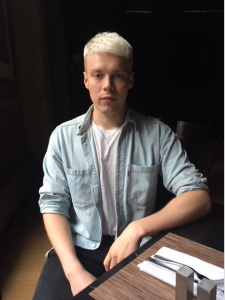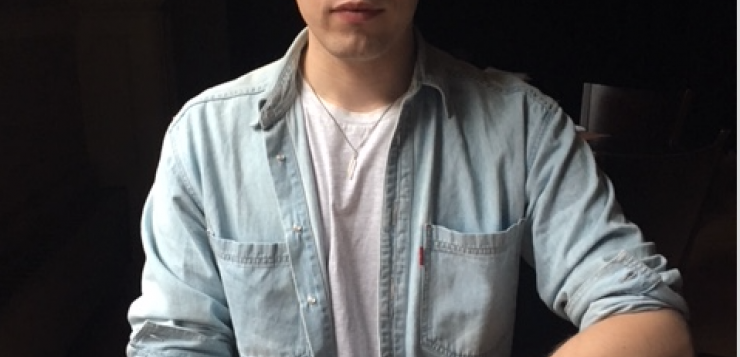A MOMENT in the Reeds is a beautifully romantic film by the young Finnish director Mikko Makela. The story centers on two young men: Leevi (played by Janne Puustinen), a Finnish student  who returns home from his studies in Paris to help his father repair their summer cottage, and Tareq (Boodi Kabbani), a Syrian refugee, whom the father hires to help with the carpentry. When the father is called away on business, the young men, whom Makela describes as “both pretty isolated characters,” fall into a passionate but sadly curtailed love affair.
who returns home from his studies in Paris to help his father repair their summer cottage, and Tareq (Boodi Kabbani), a Syrian refugee, whom the father hires to help with the carpentry. When the father is called away on business, the young men, whom Makela describes as “both pretty isolated characters,” fall into a passionate but sadly curtailed love affair.
Director Makela, who is 29, grew up in a small town in southeastern Finland, where he attended Finnish state schools. Placed in an English-speaking track, he was taught by American and British teachers from the fifth grade on. As a boy in Finland, Mikko had no exposure to gay life. It was only on a family trip to Paris when he was fourteen that he saw two men kissing on a train, and it all started to make sense. He opted to go to the UK for college, where he pursued medieval and Renaissance studies but also joined a film society. While pursuing a master’s degree in London, he got his first taste of film directing, working on music videos and fashion videos. A Moment in the Reeds is his first full-length narrative film.
Makela was in Boston for the screening of his film at the Museum of Fine Arts. The next day, I interviewed him at the Lenox Hotel.
Philip Gambone: Which gay film made the biggest impression on you?
Mikko Makela: Brokeback Mountain. Funnily enough, that film led to my coming out. After I went to see the film, my mother said to me, “I hope you don’t have those kinds of feelings. If you do, you should tell us so that we can make sure we can fix that.” I was fifteen. It was sooner than I’d planned, because I had always planned to be out of the house before I told them. My parents are quite religious—Christian evangelical—so they really didn’t take it well. They sent me to a prayer meeting: the idea was that I could be converted back. They insisted that I pray that I turn straight, which I did, sincerely, for a few years.
PG: Who have been some of your role models as a director?
MM: Stanley Kubrick has been one of the biggest. My style is quite different from his, but there is something about his dedication to craft and attention to detail that I always found inspiring. Then, in terms of style, I’m drawn to Woody Allen’s work. I connect so much with his characters, their concerns. As for younger filmmakers, the Dardenne brothers. I admire the realism, the naturalism of their filmmaking, and their very human stories.
PG: You said that A Moment in the Reeds is somewhat autobiographical. Are you at all concerned that you may upset people close to you? For instance, has your father seen the film?
MM: No, and if I’m entirely truthful, I am a little bit worried about his reaction. There are bits of dialogue that are inspired by his attitudes. But, unlike the father in the film, he’s not a racist, not xenophobic, and he never has been. But these undertones in the father’s character—well, many Finnish men could see themselves in that character.
PG: Some of the dialogue seems to be improvised, am I right?
MM: Yes, I was trying for authenticity of communication. To a certain extent, I wanted the actors to be themselves. If they had rehearsed their lines too much it would have lost all of that immediacy. I was seeking unexpected reactions as well. I’m always more interested in capturing something that’s surprising or authentic that I might not have thought of myself. We only did a bit of rehearsal, because I wanted to maintain the immediacy. Boodi and Janne first met in the audition. We tried a few scenes. I asked them to play it in their own words.
PG: Did you rehearse the sex scenes?
MM: No, they weren’t rehearsed. I think everyone was a bit scared about doing it, because for most people in the shoot it was their first time filming a sex scene. It was about a week into the shoot, so by then Boodi and Janne were really comfortable with each other. The two actors are gay. That was crucial to the improvisation. The choreography wasn’t very detailed. I allowed the actors to get on with it, and it was very convincing. I wanted them to live in character as much as they could, and do what felt right in the moment rather than micromanage them.
PG: I was surprised that in the two major sex scenes, Leevi is the top in one scene and the bottom in the other.
MM: I discussed this with the actors. Together we came to that decision: that they are meeting as equals. Not that there would necessarily be anything unequal about it if one was [an exclusive]top and the other a bottom. I guess it’s about both characters being open to experience. We also wanted to avoid the stereotype of the Arab always being the top. That was important for Boodi as well.
PG: Will you comment on the lovely romanticism of the film?
MM: I always wanted to make a romantic film, even though it has a melancholy ending. When we were filming some of the romantic montages with the music, I think the actors themselves felt that it was going to be too much. But I’m so glad my vision translated in the end, because I felt that these were beautiful moments. Of course, you have to be careful not to make it too sappy. Because I did the editing myself, I had control of the tone. One thing that was really important to me was not making the romantic element too Hollywoodish.
PG: Perhaps the most powerful line in the film is when Tareq tells Leevi that Finland, for better or worse, is now his country, that he does not have the luxury to move about Europe pursuing this love affair. Will you talk a little more about that?
MM: That line was actually from Boodi. He made it up when we were devising the scene. That was the establishing paradox of the film: that the love affair should be happening in this place that means such different things to these two people. Tareq has come to Finland for asylum, for refuge. It represents more positive things for him. Some of the drama arises from Leevi’s not being conscious of his privilege—pursuing this romance and not really thinking about what the consequences might be for Tareq. They are both seeking freedom and their place in the world. The melancholy aspect of it is that this encounter sets up an impossible situation. They are both people who can recognize the beauty even of a brief encounter, in what another person can give them over just a few days.
PG: How much research did you do? Did you, for instance, interview other asylum seekers from the Middle East?
MM: In the writing process, I didn’t have much time to do research. Once we found Boodi, it was very clear that I wanted him to feed into the project. He himself did interview other gay asylum seekers whom he knew. Because he had come to Finland as a UN refugee, he wanted to interview other people who had made that journey by sea and land. It was very important for him that he was giving an honest representation that people would recognize. We were so lucky to find him for the part: not only is he a gay Syrian in Finland who wanted to be part of the project, but it turned out he also can act.
PG: In the sauna scene, Tareq reveals to Leevi that in his country, men never show their naked bodies to other men. I’m wondering about the cultural dislocation that Muslims must experience when they find themselves in more sex-positive European countries.
MM: Sex positivity is something I believe in myself, but of course one has to respect other people’s reservations and views. At the same time, I think that with a lot of gay asylum seekers who have come to Europe, there is an attachment to more of a universal gay culture as well, especially if they are fleeing persecution in their country for being gay. They join a gay diaspora: a gay culture that crosses borders. I know that Boodi was very much seeking to be a part of a Western gay community, and has found himself at home there.
PG: Do you consider yourself a filmmaker or gay filmmaker?
MM: I think I consider myself a filmmaker. But I do recognize that most of the things I’m interested in doing now are gay stories or stories with gay characters and gay issues. I want to tell stories that aren’t gay, as well. A dream project for me would be to make a sci-fi film based on Arthur C. Clarke’s Rendezvous with Rama [1973], which has never been made into a film.
PG: Have you been surprised by the reception your film has received?
MM: I was very concerned that it wouldn’t be received well, so I was very pleasantly surprised, particularly the way it’s been able to travel: Chicago, Philadelphia, Germany, Sweden, Spain, Australia. In Germany we are getting our first major distribution. Because of all the queer refugees and asylum seekers, the German audiences have been able to connect with the story.





